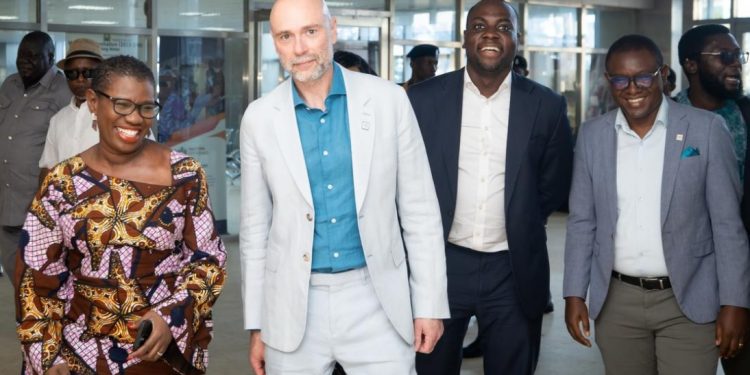By Hassan Osman Kargbo
Freetown’s commitment to tackling climate change took a significant step forward as Mayor Yvonne Aki-Sawyerr welcomed the Executive Director of C40 Cities, Mark Watts; and Johnson Situ, Director of the C40 Co-Chair’s Office, to the city for an important familiarization visit.
The meeting, organised April 3, 2025, highlighted Freetown’s growing role in global climate action and its partnership with C40 Cities, a network of cities committed to addressing climate change through collective action and knowledge sharing.
C40 Cities is a key player in supporting cities implement climate solutions and strengthen resilience to environmental challenges. Freetown, as a member of C40, benefits from the platform’s focus on peer-to-peer learning, access to international climate finance, and opportunities to collaborate with other global cities on climate initiatives.
During his visit, Watts took the opportunity to emphasize the shared global responsibility of cities in the fight against climate change, expressing enthusiasm for the work Freetown is already doing and the progress made in key climate interventions, including the cable car feasibility study. C40 Cities provided the funding for this study, and Mark Watts, alongside Johnson Situ, participated in a Steering Committee meeting with key government stakeholders such as the Ministry of Transport, the Ministry of Lands, and the Ministry of Finance.
The meeting aimed at advancing the cable car project, which is poised to improve urban mobility and help alleviate some of the transportation challenges in Freetown. “This is an exciting time for Freetown,” said Watts during his visit. “C40 Cities is committed to working alongside the city to ensure that impactful climate solutions are realized; and the cable car project is just one example of how we can collaborate to reduce emissions and improve the quality of life for residents.”
Progress on the Cable Car project is already underway, with the identification of potential funding partners and the goal of securing financing for its implementation. The project has gained traction due to its potential to reduce traffic congestion, decrease carbon emissions, and offer a modern transportation solution to residents of Freetown, a city with a rapidly growing population and expanding urban challenges.
The visit also marked a significant milestone for Freetown’s climate efforts, as Watts announced that the city had secured funding for two crucial climate action initiatives. First, a partnership between C40 Cities’ Breathe Cities program and African Cities for Clean Air will focus on improving Freetown’s air quality. The initiative will include the deployment of low-cost air quality sensors across the city to monitor pollution levels and provide actionable data to improve public health.
Secondly, the city was awarded $100,000 in funding from the Rockefeller Foundation for the “Enhancing Heat-Health Resilience in Freetown” project, and initiative to focus on integrating climate and health data, training local community workers, and strengthening inter-agency collaboration to mitigate the impact of extreme heat on vulnerable populations in the city. Importantly, both projects are expected to create significant job opportunities for young people in Freetown, a critical aspect of the city’s commitment to sustainable development and economic empowerment.
In addition to the exciting developments, Mayor Aki-Sawyerr noted that C40 Cities is also funding research on nature-based solutions for rainwater harvesting at the community level in Freetown. This research is part of the city’s broader efforts to address the growing water scarcity issues facing residents. “Access to water remains the number one priority for our people, and we are optimistic that the findings from this study will offer innovative, nature-based solutions to improve water access for all ‘Freetonians,’ ” said the Mayor.
Mayor Aki-Sawyerr’s efforts to enhance Freetown’s climate resilience have been supported by several global institutions, including the World Bank, which is a major funder of the city’s climate projects. During the visit, the Mayor and Watts engaged in a productive meeting with Abdu Muwonge, the World Bank Country Manager, to discuss the financial support for Freetown’s climate actions, including the ambitious #FreetownTheTreeTown initiative, which focuses on greening the city to improve air quality and enhance urban ecosystems.
Over the next two days, Mark Watts and Mayor Aki-Sawyerr will continue their discussions with national leaders, young climate advocates, and local stakeholders to reinforce partnerships, highlight the role of youth in climate action, and visit key climate interventions in Freetown.
Reflecting on the visit, Mayor Aki-Sawyerr expressed optimism about the future. “This visit is a major step in unlocking further resources for climate action in Freetown. The partnerships we are building will help us implement sustainable solutions that directly benefit our communities, create jobs, and enhance the resilience of our city to the impacts of climate change,” she said.
With a clear vision for a sustainable, resilient future, Freetown’s climate efforts continue to gain momentum, bolstered by the support of global organizations like C40 Cities, the Rockefeller Foundation, and the World Bank. The city’s commitment to addressing climate challenges is paving the way for a greener, more resilient urban future.










